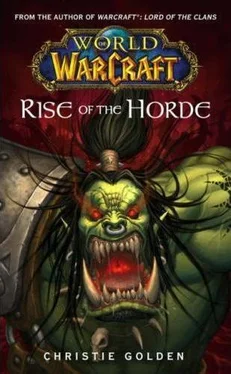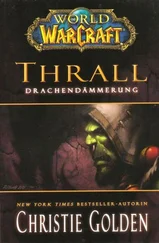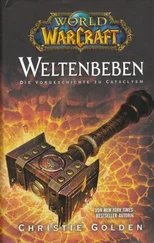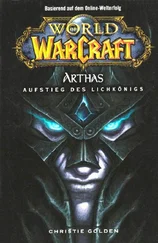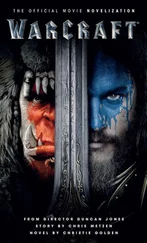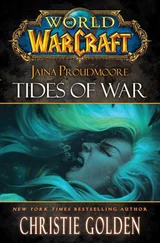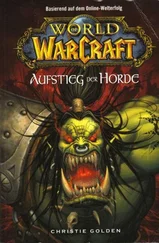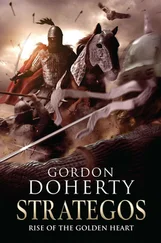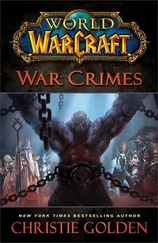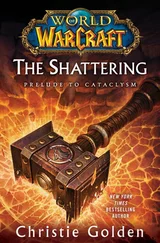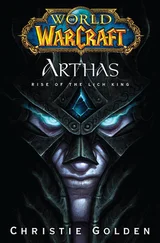They spoke of man’ari.
Suddenly, many things fell into place with a dreadful logic. The abrupt, irrational attacks by the orcs. Their sudden increase in technology and skills. The fact that they had turned their backs on shamanism, a religion that, as Velen understood it, required a give-and-take relationship between the elemental powers and those who would wield them. Those who would command man’ari did not seek balance or harmony with their power; They sought dominance.
Just as Kil’jaeden and Archimonde had.
The orcs were nothing more than pawns in the hands of the eredar. Velen knew that he and the rest of the draenei, the “exiles,” were the real targets. The orcish Horde, augmented now with creatures that were immensely powerful, was the way by which Kil’jaeden sought to destroy him. For a brief moment Velen wondered if perhaps the new leader of this Horde would listen to reason; if he would turn and fight alongside the draenei to overthrow Kil’jaeden once he learned how he had been used. He dismissed the thought almost at once. It was probable that those who were being used by Kil’jaeden knew of the eredar’s true nature and purpose, and the offer of power likely seemed believable as well as seductive. So had Archimonde and Kil’jaeden succumbed, and they were far older, stronger, and wiser than any orc.
And now, this vision, adding insult to injury. A vision of the lumbering ogres allying with the orcs—something that he once would have dismissed as a dream brought on by a too-rich meal. Now, he knew it to be the truth. Something had changed the inherent nature of the orcs so drastically, so irrevocably, that they had allied with creatures that they had hated for generations against the draenei, a people they had been tentative friends with for almost as long.
If this had happened elsewhere, the response would be simple. Velen would gather his people and flee, protected by the Naaru. But the ship had crashed, and K’ure lay dying, and there was no escape other than fighting against this Horde and praying that somehow, some way, they would survive.
Ah, K’ure, my old friend. How I miss your wisdom now, and how bitter it is that you be in the hands of the enemy, who does not even understand that you exist.
He held the stone known as Spirit’s Song close to his heart, and felt the faintest of flickers from the dying Naaru. Velen closed his eyes and bowed his head.
Gul’dan looked around the room with utter satisfaction. Everything was going as planned. The Shadow Council had been meeting for some time now, and thus far, Gul’dan felt confident he had selected them well. They were all prepared—nay, eager—to turn their backs on their people in order to advance their own aspirations to power. They had accomplished so much already, acting through their puppet that was foolish enough to believe he was a true part of the Council rather than simply their mouthpiece. It had been easy to get him elected Warchief, and as long as the Council smiled and nodded at him for the few moments that he attended the meetings, he did not question his position. But Blackhand always departed before the real meetings began, sent off on some mission or other that made his barrel chest swell with pride.
“Greetings,” Gul’dan said as he slipped into his chair at the head of the table. As always, Ner’zhul lurked in a corner, never invited to sit with the others, but permitted to hear their conversations, Kil’jaeden had so instructed, and while Gul’dan was unsure as to why his benefactor desired this, he wanted nothing more than to stay in Kil’jaeden’s good graces and did not demur.
The Council murmured perfunctory greetings, and Gul’dan got down to business. “How are the various clans reacting to the idea of ogres as allies? Kargath, let’s start with you.”
The chieftain of the Shattered Hand clan grinned and grunted. “They are primed for bloodshed, and they don’t care who helps them slit open draenei throats,”
Rough laughter filled the cavern as many of the Council nodded in agreement. In the dim light provided by the torches, their eyes seemed to Gul’dan to glow orange. A few, however, scowled and did not join in the merriment.
“I have heard protests from some in the Whiteclaw clan.” one said. “And Durotan of the Frostwolves still bears watching, for all that he led the attack on Telmor.”
Gul’dan held up a hand. “Do not fear, I have had Durotan in my mind for some time.”
“Why has he not been eliminated?” Kargath growled angrily. “It would be easy to replace him with another more in line with our plans. Durotan is becoming well known for disagreeing with Blackhand’s position—and yours as well.”
“That is precisely why I still need him alive,” Gul’dan said, watching to see who understood without further explanation. He saw comprehension register on a few faces, while others still looked puzzled and angry.
“Because he is known for a more moderate stance,” Gul’dan continued, regretful that he had to spell it out for anyone on the Council, “when he does Finally go along, everyone else who might have doubts goes with him. He speaks for many who do not dare speak for themselves. If Durotan agrees, so goes their logic, then it must be all right. As Kargath mentioned, the Frostwolf clan is not the only one who appears to have reservations,”
“But … what if there comes a time that he does not agree? Some line he is not willing to cross?”
Gul’dan smiled frostily. “Then we will deal with him in a way that best advances our power without placing it at risk. As we always do.” Gul’dan decided it was time to change the subject. He leaned forward, placing his hands on the table. “Speaking of those who have reservations. I have heard that there are some who continue to attempt to contact the elements and the ancestors.”
One of the members looked uncomfortable. “I have attempted to dissuade them, but I cannot see how I can punish them for it. It was, after all, belief that the ancestors wanted us to attack the draenei that even made this possible.”
He sounded a bit defiant. Gul’dan smiled reassuringly “Yes indeed. That was the bait that hooked them so deeply.” He glanced over at Ner’zhul. The older shaman met his eyes and then glanced down quickly. Such had been the bait that had hooked Ner’zhul as well—bait that did not hold the same appeal for Gul’dan.
“But that is no longer necessary,” Gul’dan continued. “We must make sure that there is no turning back to the old ways. We have been lucky indeed in our campaign, and with the ogres success is likely to continue. But if there are any setbacks, any battles that go poorly, then those who still hold shamanism close to their hearts may find an appreciative ear. That won’t do at all.” He tapped his chin thoughtfully. “We must do more than simply encourage warlock practices. We must actively discourage shamanism. It would be unfortunate if for some reason the ancestors actually were able to communicate with their descendants.”
Again, he glanced at Ner’zhul. It had only been when Ner’zhul had traveled to the sacred mountain that he had been able to speak with the ancestors and discover what had really been going on. Until that point, even as powerful a shaman as he was, Ner’zhul had been tricked by illusions. The answer, therefore, seemed simple.
Deep in the disembodied dreaming floated the beings that were made of light. They had the memories of what had gone before, and they had glimpses into the future. Long had they dwelt here, fed by the Other, who was like them, but not like them, and who they sensed was well into the heart of a slow passing. Until recently, they had dwelt in this state of being-not-being in peace and tranquility. But now, defilement and hatred and danger had come. They could not reach the sleeping, beloved living any longer. And the beloved living did not come as they used to, to replenish the sacred pool and unintentionally keep the Other alive. Only the Greatly Deceived One had come, weeping and begging, but too far lost in the deception to be aided.
Читать дальше
